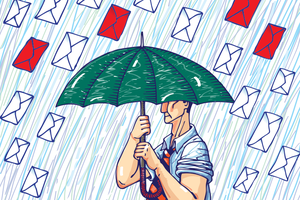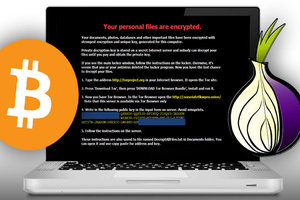Anti-Spam: protecting your Inbox
 Unwanted email has long stopped being just a source of advertising services or products. The time it takes to erase all spam messages from your inbox is not the only drawback of this threat. It’s not a secret that cybercriminals use spam as a channel to spread malware: malicious objects are, as a rule, attached to the message.
Unwanted email has long stopped being just a source of advertising services or products. The time it takes to erase all spam messages from your inbox is not the only drawback of this threat. It’s not a secret that cybercriminals use spam as a channel to spread malware: malicious objects are, as a rule, attached to the message.
Spam might also contain a link to malicious web resources serving the ground of a phishing attack or are injected with a malicious code. That means, once in the inbox, such emails would become an open door for a banking Trojan and, as a result, become a means of stealing money from online banking systems.
Read moreDo you use WhatsApp? Get ready for more spam
 According to CEO and co-founder of WhatsApp messenger Kum Yang, the number of monthly active users messaging application mark of 800 million people in April 2015.
According to CEO and co-founder of WhatsApp messenger Kum Yang, the number of monthly active users messaging application mark of 800 million people in April 2015.
Present owner says the number of WhatsApp users will exceed 1 billion. In the last few days WhatsApp users actively send each other messages that the service will soon be paid. To use free messenger and become a frequent user, it is necessary to send a warning to ten people from your contact list. “Jim Balsamic, CEO WhatsApp” is mentioned as the author of the message. Security experts recommended to ignore spam.
Read moreThe spammiest nations on Earth
 A new report has identified which countries to blame for the continuing presence of spam in our daily lives. Sophos’ ‘Spampionship’ found that the US remained the number one provider of spam by volume across the first three months of the year.
A new report has identified which countries to blame for the continuing presence of spam in our daily lives. Sophos’ ‘Spampionship’ found that the US remained the number one provider of spam by volume across the first three months of the year.
Sophos calculated the results through a global network of ‘spamtraps’ – sites and accounts set up around the world with the sole purpose of obtaining spam, with the sender’s IP addresses used to identify its location.The company also produced a separate leaderboard based on identifying the highest spam-producing countries relevant to their population, showing which countries are becoming adept at sneaking under the radar.
Read moreA malicious file slyly is tucked away inside a fake Kaspersky program
 An ambitious attack was unleashed and directed at Websense employees in the guise of a welcoming, if grammatically questionable, message. Emails were seen, containing a malicious file slyly tucked away inside a fake Kaspersky installation program.
An ambitious attack was unleashed and directed at Websense employees in the guise of a welcoming, if grammatically questionable, message. Emails were seen, containing a malicious file slyly tucked away inside a fake Kaspersky installation program.
Strike while the iron is hot - the maxim serves many “bad actors” well. Breaking news of any kind spurs threat actors and scammers into action. From capitalizing on good will and subverting charitable intentions after a humanitarian crisis, to getting ahead of legitimate communication in the wake of corporate announcements, the race to exploit, extort, and elicit is a sprint and not a marathon.
Read moreThe new spam comes from interactive robots
 It was the middle of the day, and my cell phone rang with a local number I didn't recognize. Figuring it was one of my kids calling from a friend's phone to tell me that they had forgotten their cell phone and needed a ride, I answered — and found myself rapidly descending into the uncanny valley.
It was the middle of the day, and my cell phone rang with a local number I didn't recognize. Figuring it was one of my kids calling from a friend's phone to tell me that they had forgotten their cell phone and needed a ride, I answered — and found myself rapidly descending into the uncanny valley.
"Amy" was, in fact, an outbound interactive voice response program running on a server, likely somewhere in a cloud data center. The company behind the call was the latest incarnation of a sweepstakes and magazine subscription scam operation currently known as North American Direct Services, Inc.
Read moreTrojan is distributed through fake WhatsApp messenger
 Security experts warned about a new attack on users of WhatsApp messenger. Under the guise of the web version of messenger is distributed Trojan. Attackers send out e-mail letters of invitation to download the desktop application WhatsApp Web, issued by the manufacturer at the end of January 2015.
Security experts warned about a new attack on users of WhatsApp messenger. Under the guise of the web version of messenger is distributed Trojan. Attackers send out e-mail letters of invitation to download the desktop application WhatsApp Web, issued by the manufacturer at the end of January 2015.
Referring to users, scammers use social engineering techniques. Messages contain a link, supposedly leading to the official website of WhatsApp. Actually clicking the user goes to another site where download the executable file WhatsAppInstall.exe. Under this name hides a Trojan Downloader.
Read moreA new spam targets corporations
 A new spam wave has hit hundreds of mailboxes with malicious .chm attachments to spread the infamous Cryptowall ransomware.
A new spam wave has hit hundreds of mailboxes with malicious .chm attachments to spread the infamous Cryptowall ransomware.
Cryptowall is an advanced version of Cryptolocker, a file-encrypting ransomware known for disguising its viral payload as a non-threatening application or file. Its payload encrypts the files of infected computers in an effort to extract money for the decryption key. Malware researchers found that the email blast, which took place in February, targeted users from around the world, including the UK, the US, the Netherlands, Denmark, Sweden, Slovakia and Australia.
Read moreCTB-Locker is the newest crypto malware
 From late 2013 through the first half of 2014, CryptoLocker malware was a major concern for many businesses and individuals. The FBI was able to successfully disrupt CryptoLocker, along with Game Over Zeus, but according to the figures in their legal complaint against Evgeniy Bogachev, not before his malware had encrypted a lot of computers.
From late 2013 through the first half of 2014, CryptoLocker malware was a major concern for many businesses and individuals. The FBI was able to successfully disrupt CryptoLocker, along with Game Over Zeus, but according to the figures in their legal complaint against Evgeniy Bogachev, not before his malware had encrypted a lot of computers.
The second major Crypto Malware was CryptoWall. In Malcovery's 3rd Quarter malware report, there were documented 24 separate spam campaigns that resulted in CryptoWall infections. Today we may have seen the beginning of the Next Wave of Crypto Malware being delivered by spam.
Read moreCanadian new rules should cut malware
 All you wanted to do was download a game from the Internet, and the next thing you knew, your browser homepage had changed, an unwanted toolbar appeared, and you found yourself plagued by annoying pop-up ads that danced around your screen.
All you wanted to do was download a game from the Internet, and the next thing you knew, your browser homepage had changed, an unwanted toolbar appeared, and you found yourself plagued by annoying pop-up ads that danced around your screen.
Such experiences should be less of a problem for Canadians thanks to new rules from the Canadian Radio-television and Telecommunications Commission which came into effect last week. The new guidelines make it illegal to install programs on an individual’s computing device without the operator’s consent. The rules are designed to protect Canadians from damaging and deceptive forms of spam.
Read moreWhatsApp sees increasing complexity of spam campaigns
 Over the past few months, AdaptiveMobile has tracked an increase of spam complexity on messaging apps, such as WhatsApp, in the United States, Europe and India, and expects these attacks to continue through 2015.
Over the past few months, AdaptiveMobile has tracked an increase of spam complexity on messaging apps, such as WhatsApp, in the United States, Europe and India, and expects these attacks to continue through 2015.
These campaigns have methodologies and content similar to SMS messaging abuse threats, providing evidence that the criminal groups are now also targeting messaging apps as service providers have succeeded in reducing levels of SMS spam. In particular, criminals are using WhatsApp to target users with text spam. Recent campaigns targeting WhatsApp users include investment spam messages sent from United States numbers to Europe.
Axarhöfði 14,
110 Reykjavik, Iceland















